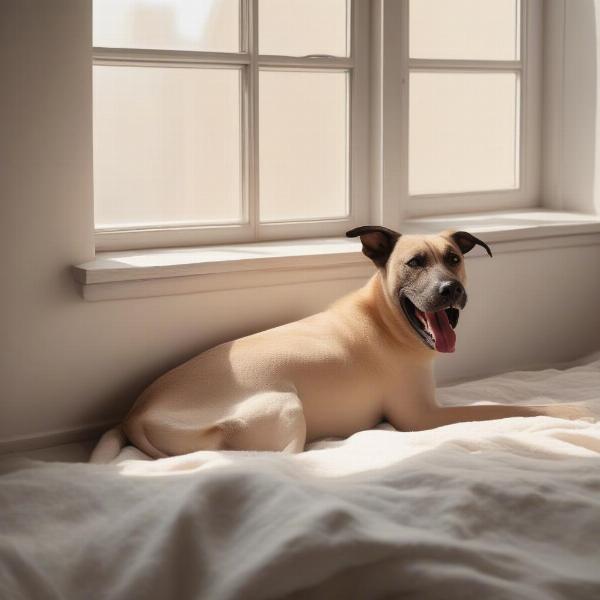Panting is a normal way for dogs to regulate their body temperature. However, excessive or unusual panting at night can be a sign of an underlying issue. Understanding the reasons behind your dog’s nighttime panting is crucial for ensuring their well-being. This article will explore the various causes, from the simple to the more serious, and offer guidance on when to seek veterinary attention.
Common Reasons for Nighttime Panting
Several factors can contribute to a dog panting at night. Some are benign, while others may require veterinary intervention. Let’s delve into the most common causes:
Temperature and Environment
Is your home too warm? Dogs don’t sweat like humans; they rely on panting to cool down. A stuffy room or a thick blanket can easily overheat a dog, leading to panting. Make sure your dog has access to a cool, well-ventilated space at night.
 Dog panting in a hot room
Dog panting in a hot room
Anxiety or Stress
Just like us, dogs can experience anxiety and stress. Nighttime noises, separation anxiety, or changes in routine can trigger panting. Creating a calming bedtime routine and providing a safe, comfortable space can help alleviate anxiety.
Pain or Discomfort
Panting can be a sign of pain or discomfort. Arthritis, injuries, or other medical conditions can cause nighttime panting. If your dog is exhibiting other signs of pain, such as limping, whining, or changes in behavior, consult your veterinarian immediately.
More Serious Causes of Panting at Night
While many causes of nighttime panting are relatively harmless, some can indicate a more serious medical condition:
Heart Problems
Heart disease can make it difficult for a dog to breathe, leading to increased panting. old dog panting is often associated with heart conditions. If your dog’s panting is accompanied by coughing, lethargy, or exercise intolerance, seek veterinary attention.
Respiratory Issues
Respiratory infections, such as pneumonia or kennel cough, can cause panting and difficulty breathing. Other respiratory issues, like asthma or allergies, can also trigger panting.
Cushing’s Disease
Cushing’s disease, a hormonal disorder, can cause increased panting, along with increased thirst and urination.
Bloat
Bloat, also known as Gastric Dilatation-Volvulus (GDV), is a life-threatening condition that can cause panting, a distended abdomen, and retching. This requires immediate veterinary attention.
When to See a Vet
If your dog’s panting is sudden, severe, or accompanied by other symptoms such as vomiting, diarrhea, collapse, or difficulty breathing, seek immediate veterinary care. my dog is panting at night and also exhibiting any unusual behavior warrants a vet visit.
Reducing Nighttime Panting
-
Ensure a Comfortable Temperature: Keep your dog’s sleeping area cool and well-ventilated. Consider a fan or air conditioning, especially during warmer months. dog heavy panting at night can be significantly reduced by managing the temperature.
-
Create a Calming Environment: A comfortable bed, calming music, or a familiar toy can help reduce anxiety-related panting.
-
Regular Exercise: Adequate exercise during the day can tire your dog out and promote restful sleep, reducing the likelihood of nighttime panting.
-
Maintain a Healthy Weight: Obesity can exacerbate panting. Ensure your dog is at a healthy weight through proper diet and exercise.
Conclusion
Nighttime panting in dogs can have various causes, ranging from simple environmental factors to serious medical conditions. Paying close attention to your dog’s behavior and other symptoms is crucial in determining the underlying cause. If you’re concerned about why is my dog panting at night, it’s always best to consult with your veterinarian for a proper diagnosis and treatment plan.
FAQ
- Is it normal for dogs to pant at night? Occasional panting can be normal, especially if it’s warm. However, excessive or persistent panting warrants further investigation.
- How can I tell if my dog’s panting is serious? If the panting is accompanied by other symptoms like vomiting, diarrhea, or difficulty breathing, seek immediate veterinary care.
- Can anxiety cause panting in dogs? Yes, anxiety and stress are common triggers for panting.
- What should I do if my old dog is panting heavily at night? dog jacket french bulldog might help for older dogs with issues. But consult a vet, as heavy panting in older dogs can indicate underlying health problems.
- How can I make my dog more comfortable at night? Ensure a cool, comfortable sleeping area, a calming routine, and address any potential anxieties.
- When should I take my panting dog to the emergency vet? If the panting is sudden, severe, or accompanied by other concerning symptoms, seek immediate emergency care.
- Can pain cause a dog to pant at night? Yes, pain and discomfort can lead to panting, especially at night when it’s quieter and distractions are minimized.
About ILM Dog
ILM Dog is your trusted resource for expert advice on dog care and wellbeing. We offer comprehensive information on breed selection, health, training, nutrition, grooming, and much more. Whether you’re a new dog owner or a seasoned expert, ILM Dog provides practical, reliable advice to help you provide the best possible care for your canine companion. Contact us today for personalized guidance. Email: [email protected], Phone: +44 20-3965-8624.